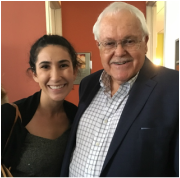|
Dr. Hannah Singer I’ve never been one to get starstruck, but I totally geeked out getting to meet internationally-renowned psychologist, grief expert, and co-author of the Harvard Child Bereavement Study, Dr. J. William Worden. I mean, the man is a legend in the psychology world! Worden’s Four Task Model of grief was developed over 30 years ago and is used around the world as the primary grief counseling model. My entire dissertation was based off Dr. Worden’s theories and models of the grief process - I must have cited his work over 100 times. I am often asked to train psychology graduate trainees on grief therapy and I always teach them Worden’s task model. And of course, Worden’s task model is what I use to guide my work when I’m working with someone in individual therapy who is grieving the death of a loved one. So imagine my excitement when I was invited to an intimate gathering to hear the one and only J. William Worden speak about making grief therapy relevant in the 21st century. I mean, just look at the goofy-ass grin on my face when I got a chance to talk to him afterward…. So embarrassing! The icing on the cake was when he asked for my business card so he could refer patients to me. The father of grief therapy wants to refer to me? The words “wait...am I in a dream?” literally came out of my mouth. Anyway… In honor of getting to meet the man who LITERALLY wrote the book on grief therapy, I thought I’d share the most widely accepted framework for understanding the grieving process. According to this model, these are the four tasks that every griever must accomplish in order for healing to occur. Although they are numbered, these tasks are not linear and don’t need to be completed any particular order. Worden's Four Tasks of Mourning |
About.I'm a clinical psychologist and adult psychotherapist based in Los Angeles. I specialize in treating anxiety, trauma, and perinatal mental health using traditional talk therapy, mindfulness-based therapy, and EMDR. Stay postedCategories
All
Archives
March 2020
|



 RSS Feed
RSS Feed